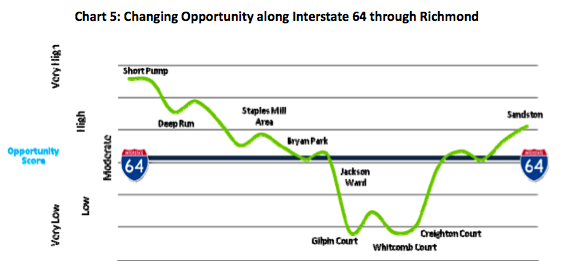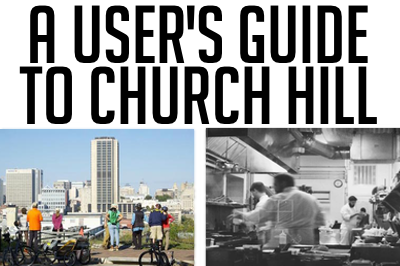RECENT COMMENTS

Inequality and I-64
VIA Where You Live Makes All The Difference: An Opportunity Map of the Richmond Region (PDF), a 26-page look at the health, transportation, housing, and education opportunities in the area.
Where You Live Makes All the Difference: An Opportunity Map of the Richmond Region maps over twenty-two socioeconomic metrics to illustrate the role that where one lives has on accessing those characteristics that everybody looks for when deciding where to live: good schools, safe homes, close to work, nice neighborhood, etc. Where we live directly impacts the schools our children attend. It also impacts our ability to get a sustainable home mortgage, our potential job opportunities if we don’t have a car, our ability to create wealth, and provide for our families. In short, where you live directly influences your ability to access the opportunity cycle – that is the opportunity to get a good education, a good job, purchase a home, build wealth, and pass that wealth along to your children. Brian Koziol, author of the report and HOME’s housing research analyst stated, “Because of past policies, we have isolated residents into areas of low opportunity. We must figure out a way to pave the way for them to create generational wealth and opportunities for their children.”






The exec summary says “Where you live should not limit your employment opportunities.”
HOME’s Solution: “Develop a regional transportation policy that effectively connects workers to jobs.”
Now, if only we could only get the city and counties to work together on that mass-transit system. That’s a better use of our tax-payer dollars than building a new stadium.
As usual with these types of studies, the fingers are pointed at the private sector and vague lack of opportunity but no mention of government’s role in creating this hellhole. The answer is MORE money to City Hall! MORE commissions! MORE public housing!
Never mind that the reason the opportunities moved to the suburbs is because those who have the choice wanted to get away from this mismanaged mess of a city, pay lower taxes for better services and not be near the toxic cesspools of our projects.
Richmond continues to think that the answer is just to keep driving the buses out farther and farther. Stop shitting in your own bed Richmond and the opportunity will come to you.
1. Blow up the projects tomorrow. Replace that spending with a cash voucher for poor families given as long as the person continues to be enrolled in job training or continuing ed classes or is actively looking for work. The city has proven that they can’t run housing for shit.
2. Introduce accountability at the top of RPS. Administrators must show progress or they are gone. Pay is heavily tied to performance. Get rid of a few of those fat cats drawing the big salaries in city hall for managing the horror show that is RPS and funnel that money to teachers. Having the most management of any school district won’t attract great teachers. Paying higher salaries would.
3. Trim enough fat from the rest of the bloated city hall staff to be able to get tax rates low enough to attract businesses back downtown.
4. Cut out the cronyism and self dealing.
That’s probably not all that’s needed but I’d bet these steps would do more good then more of the same.
@Alex- Please run for Mayor! You have my vote. Or at least start a kickstarter fund for you to rent a billboard outside City Hall.
@Elaine: The counties don’t want to work with the City on much of anything. The reality is that much of the growth in the counties are from people who either fled the City or looked at it and decided it was not worth living here. The residential opposition, especially in Chesterfield, to their money being diverted to a mass transit system they don’t use for the benefit of City residents, would make the overwrought hand-wringing over the vinyl windows issues before CAR seem comical.
HOME’s transportation solution is out of whack with political realities that are not going to change any time soon thereby making their proposed solution silly. We have to deal with the realities we have, not the political fantasies we dream up.
And we need to do the new stadium. I don’t want to do it. But we have to. We made a promise to that team when we came here. If Richmond gains a reputation with making deals with businesses seeking to relocate or expand and then does not follow through with the incentives it promises, it makes the City a tougher sale for future deals. Wish we never promised the stadium, but now that we did, we need to do it, even if the counties walk. It’s an investment in our reputation as a locality businesses can depend upon as a partner.
HOME solution was transportation to bring people to the jobs. What HOME should have asked why aren’t there jobs near these people and what are the obstacles or disincentives to bringing jobs here? Why are the jobs somewhere else?
It’s because the city refuses to acknowledge the problems we have. Right now we’re living in a fantasyland here.
Today in the paper, Mayor Jones is quoted as saying he wants to work with the school board to find a superintendent who will “help take us to even greater heights.” Greater heights? Seriously? Getting to the academic equivalent of sea level would be a greater height for RPS. 30% of city schools are accredited with warning. Some of that is due to testing changes, but half of the schools in the region without full accreditation are in the city. We don’t need someone to take us to greater heights. We need someone to pull us out of the pit.
This is just one example of the City burying its head in the sand instead of facing up to problems of basic management. The list goes on from there—an inability to systematically do street maintenance…an unwillingness to deal with spot blight and tax arrears on vacant properties that discourages investment…a housing system that ghettos our poor into crime-riddled enclaves rather than providing the resources—like Alex proposed–to put these folks in proximity of jobs and reduce concentrations of poverty that become no-investment zones.
The only way to deal with the inequality is for the City to begin to make some hard choices to draw investment and opportunity back into the City. People want to bring it here. Just look at the money being invested in new restaurants and apartments. So let’s build on that and make the city even more attractive to those investors who don’t want to be bleeding edge and need a more stable and welcoming environment to draw them in. That starts with a government that is a partner in keeping neighborhoods strong, that can manage basic services competently, and decides it is not going to wait for handouts from the counties or the Commonwealth in the name of regional cooperation, before making choices and cleaning things up. The private sector has doing its part–from the folks rebuilding Sub Rosa to the people backing the renovations of the Landmark to those who are developing Scott’s Addition—to turn areas of the City around. The City needs to do its part too.
@2 – Elaine, I respectfully disagree. Your heart’s in the right place here but 50 years of history should be enough to prove that the continuous flight of jobs and opportunity farther and farther away from the city is because folks who make the decisions don’t want to mess with this city’s problems. We can keep throwing more money after chasing them but they’ll just keep moving to Powhatan. All that chasing just results in higher and higher taxes and an even less attractive city.
We need to solve our own problems. If we can’t bring the jobs back and make the city work correctly, we won’t ever get a bus that reaches far enough…
@4 – I’m flattered but I don’t have the patience for the kind of ass-kissing politics requires and I’m not connected to Richmond’s king makers so there’s no chance of that happening.
@Alex “Never mind that the reason the opportunities moved to the suburbs is because those who have the choice wanted to get away from this mismanaged mess of a city, pay lower taxes for better services and not be near the toxic cesspools of our projects.”
You say that the city is the reason behind these disparities in opportunity and I agree somewhat. The quote I put up of yours though is overlooking one very large factor in how the city (and really policy makers at the national and state levels) is responsible in this regard. It’s not that failed management led to people exiting the city because there was a interstate so people migrated to the far flung suburbs to find opportunity. The cause IS the interstate and it’s construction.
Subsidizing the flight of the middle class to other locations by the construction of the interstate, which facilitated this flight by it’s very existence, is the true root cause of the urban atrophy and the form it takes today. The prices for services seem lower because the interstate is FREE. Suburbanites don’t pay the true costs associated with their driving. One can simply move out to the suburbs without having to foot the bill for it’s construction and maintenance and that is only the tip of the iceburg when it relates to the societal costs of demolishing and displacing an estimated million people a year when federal highway construction was at it’s peak in the 60’s. All this opportunity is available to you provided you can afford the average expense of $8,000-$11,000 annually to own and maintain an automobile.
http://newsroom.aaa.com/2012/04/cost-of-owning-and-operating-vehicle-in-u-s-increased-1-9-percent-according-to-aaa%E2%80%99s-2012-%E2%80%98your-driving-costs%E2%80%99-study/
Unfortunately, the people who have both been the most negatively impacted by this (marginalized urban residents) have yet again been further impacted by the construction of public housing in a manner which further serves to limit their opportunities through the concentration of poverty (as seen in this very chart). Add to that that the interstate was very intentionally built where it was to isolate blacks from whites and systematically destroy entire communities, both black and white (Jackson Ward, Oregon Hill). White Flight and public school integration exacerbated this effect with those who hadn’t been historically marginalized and with the earnings potential to succeed leaving the community altogether and it falling into an urban wasteland of no jobs and no models of success to aspire to. This leaves the leadership in urban areas with a concentration of poverty, a high number of citizens who need expensive services yet have no opportunities to advance themselves to pay for them, and leaders who struggle to accomplish anything substantial with limited resources and extremely high levels of need.
To be certain, I am not trying to make excuses for city leadership, but one cannot overlook that the majority of the affluence seen in suburban America has been paid for with the destruction of the urban core in cities across the United States and continues to be subsidized on the backs of the most marginalized members of society who have little political capital to change their circumstances.
And in regards to county not wanting to pay for mass transit that doesn’t benefit them, boo hoo I say. I don’t want to pay for the net influx of commuters who come to downtown to work each day and tear up our roads at no cost to them!!! Maybe if we begin charging the true costs associated with offering free convenient travel in ones personal motor-coach to their downtown jobs each day we would be able to afford to have better services for the residents of the city who are shouldering the burden of paying for surbanites to make a living downtown and flee in the evening to another location.
@8 – I agree with a lot of what you are saying but it’s not so cut and dry. The transportation issue is a macro problem that is much bigger than Richmond. Richmond also has its own set of problems that further fuel the fire.
There is inefficiency in allocating costs with benefits when it comes to city roads. This could be covered with commuter taxes or tolls to enter the city during work hours. The risk is that doing so makes it harder to attract talented workers so companies move what business still exists downtown out to the suburbs. It would also make it harder to attract good teachers to city schools. It’s quite possible an action that on paper seems like it would produce more revenue would actually lower revenue at the end of the day once second order changes occur.
A higher gas tax statewide (or nationwide) to make sure that all costs of road maintenance are paid by those using them would be a great step in reducing sprawl and might be better than city level actions on this problem. However, while it would likely result in people living closer to where they work, there’s no guarantee that the end result will be Richmond. If the city continues to be a mess, it’s fairly likely that they won’t be.
At the end of the day, the city needs to focus on doing everything it can on the dimensions it alone controls to become a safe, clean, well run place to live and work. If our schools are producing failed students, our projects are breeding grounds for criminal behavior and our city government is a bunch of crooks who are stuffing their pockets we’re not going to improve even if we suddenly developed teleporters that ran on free solar power.
The broader problem with market inefficiencies in transportation is not a Richmond level problem but it is real. Sprawl is a big threat to our environment and has resulted in a lot of misallocated resources over the years (money spent on roads to enable folks to drive ridiculous commutes in comfort instead of more productive activities). It’s important to recognize that much of this was due to past government actions though. I’m not sure I want more government tinkering as the solution given this track record. Make government raise any funds for the roads by user fees and let that be the extent of government policy and a lot of this solves itself. Once you start trying to solve social issues with transportation you end up back with this kind of mess.
@Alex…I like your thinking…solve it with user fee’s. Sadly, the political power is concentrated in the hands of those who seek to continue to ride the roads for free.
I cant believe I kind of agree with some the things Alex said.
It’s kind of mind boggling that city based employment has one of the highest average weekly wages in the state –in excess of $1,000 a week according to the BLS– yet there is an insane level of poverty in the city. It seems there there’s a bunch of poor people “trapped” in the city (because it offers the best services to poor people), that cant access low paying jobs largely based in the counties (i’m thinking call centers and distribution center jobs) where is is essentially no services for the poor.
there are also a lot of issues that wont change because there is no political will, or any action on them would mean political suicide. examples:
(i) taking property away from negligent/absentee owners would really help with vacancy and neighborhood stabilization. but wont happen because you’ll upset the tea party folks
(ii) the state of rps. people need to get real about the state of school system. there doesn’t seem to be a realistic vision for rps. also the current infrastructure and bureaucracy is too large for the student population. does a city of 200,000 really need 5 general high schools and 3 specialty high schools in eight different facilities? perhpas rps needs to sell property and close schools.
(iii) eliminating much of the “affordable housing”–quite frankly, there seems to be too much affordable housing in the city. its like all affordable house in the region is in the city. why is this okay with city residents and leaders. RRHA needs to get back in the business of guiding development/redevelopment/reinvestment instead of poverty management
(iv) why are retailers avoiding the city like the plague. if someone says retail follows rooftops i’ll throw up (there’s not one walmart in east henrico. is it because of lack of demand. doubtful). there’s more to the story and i’m not sure the folk in econ & community development know the whole story or care to know. fortunately vcu is taking aggressive steps on this front (for the vcu and mcv areas).
(v) acknowledging, addressing, and being frank about the “blight of black males” in the city. perhaps engaging faith leaders and leaders in the black community to have honest discussions about this issue. doesn’t make sense that one group is committing a disproportional amount of crime in the city. ignoring it wont change anything
@12 – re: retail, I think a lot of it is not just rooftops how much disposable income is under those rooftops. It’s also possible for retail to flourish in places that aren’t particularly densely populated or wealthy but that relies on: a.) parking, b.)good commercial property, and c.) business friendly policies. Does Richmond have all three? Any of these?
Put it another way – where would one even begin to put a sizeable retail building (other than the possibly already over saturated Carytown) these days?
There’s lots of places retail can go, placing stores requires a little more ingenuity in a land-locked city than the suburbs. The VCU Kroger, new Main Street 7-11 and Shockoe Bottom Fresh Farm come to mind as examples of successful retail projects that over came the perceived obstacles.
I was just saying the city doesn’t seem aggressive about attracting retailers. Also, I’m doubtful retailers are opting out of city locations due to lack of demand.